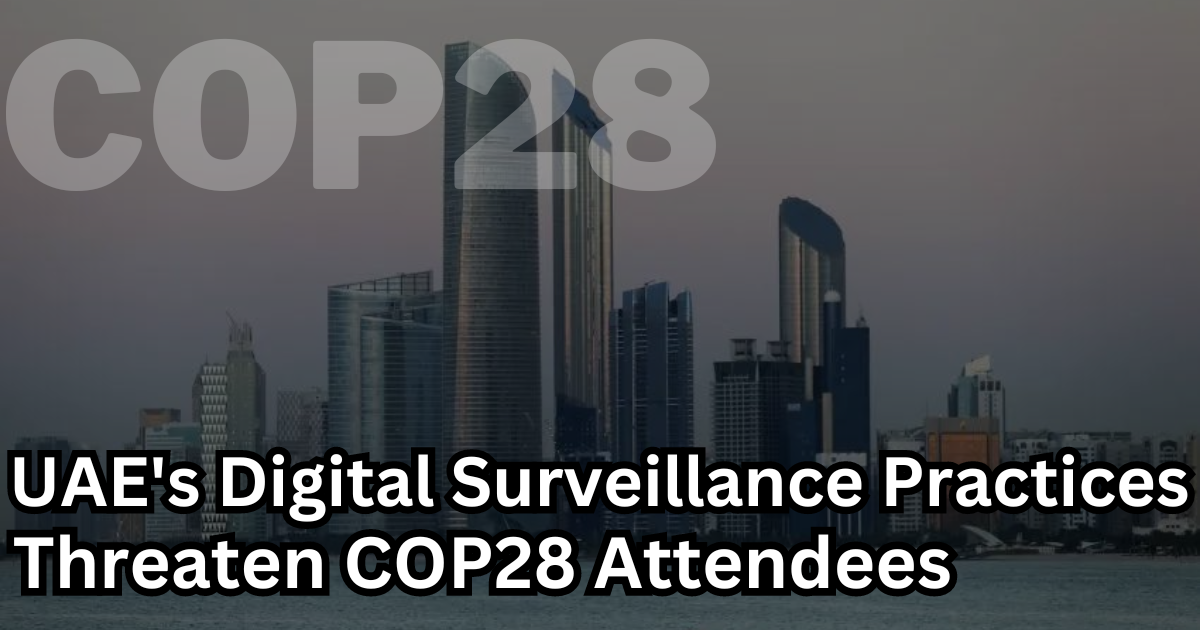As the United Nations climate summit, COP28, approaches in just two weeks, Amnesty International has raised alarm bells over the United Arab Emirates (UAE) utilization of digital surveillance to target attendees and residents. The disturbing trend of employing digital surveillance for silencing dissent and curbing freedom of expression has been a long-standing issue in the UAE.
Rebecca White, a campaigner with Amnesty’s Disrupting Surveillance Team, highlighted, “It is no secret that targeted digital surveillance has long been weaponized in the United Arab Emirates to crush dissent and stifle freedom of expression.” This repressive tactic has been notably evident in the case of Ahmed Mansoor, a human rights defender arrested in 2017 who faced cyberattacks facilitated by mercenary surveillance companies. Mansoor, often referred to as ‘the last human rights defender‘ in the UAE, remains imprisoned for over six years for openly criticizing the authorities.
What absurdity lies in the decision to appoint Sultan bin Ahmed Al Jaber, an oil executive, as the president-designate of COP28, someone tasked with addressing climate issues while being associated with an industry notorious for environmental harm and climate change. This decision raises eyebrows on the UAE’s commitment to champion environmental causes.
Amnesty and various advocacy groups have urged the U.S. Secretary of State Antony Blinken to pressure the UAE to release Mansoor and other imprisoned human rights advocates before the climate summit. The organizations also call on leaders participating in COP28 to confront the host nation’s human rights violations and questionable climate policies, especially in the face of a worsening global emergency.
“Amnesty International fears that human rights defenders and other members of civil society in the UAE may continue to be targeted with spyware, including those attending COP28,” warned Rebecca White. Despite the UAE’s commitment to providing a platform for activists’ voices during the conference, the actualization of this promise is doubtful unless fundamental human rights, such as privacy and peaceful assembly, are genuinely respected.
In August, the United Nations Framework Convention on Climate Change (UNFCCC) signed a pledge by Executive Secretary Simon Stiell and COP28 president-designate Sultan bin Ahmed Al Jaber. Al Jaber, in addition to his role in COP28, holds the position of an oil executive. This dual role creates a stark contradiction, as the president-designate responsible for facilitating discussions on climate issues is deeply rooted in an industry that has historically contributed to environmental degradation.
Heba Morayef, Amnesty’s regional director for the Middle East and North Africa, commented on the situation, stating, “The fact that the hosts of this crucial climate meeting felt the need to highlight that some form of free assembly and expression will be allowed during COP28 serves only to highlight the normally restrictive human rights environment in the United Arab Emirates and the severe limits it places on the rights to freedom of expression and peaceful assembly.”
The questionable decision to appoint Sultan bin Ahmed Al Jaber, an oil executive, as the president-designate of COP28 poses a significant contradiction. How can someone deeply entrenched in the oil industry be entrusted with leading discussions on mitigating the environmental impact of that very industry? This decision raises serious doubts about the sincerity of the UAE’s commitment to addressing climate change.
As the host nation, the UAE’s commitment to providing a platform for activists’ voices during COP28 is paradoxical. It is inconceivable to imagine genuine freedom of expression and assembly when the country’s human rights environment is marred by repression and restrictions. The international community must critically assess the suitability of the UAE as a host for a climate summit, considering its track record on human rights.
Rebecca White’s warning about the potential targeting of human rights defenders and civil society members with spyware, including those attending COP28, should not be taken lightly. The international community needs to hold the UAE accountable for its actions and ensure that the summit provides a safe space for meaningful dialogue, unrestricted by surveillance and intimidation.
In conclusion, Sultan bin Ahmed Al Jaber, an oil executive appointed as the president-designate of COP28, raises serious concerns about the sincerity of the UAE’s commitment to addressing climate change. The dual role of someone deeply connected to the oil industry-leading discussions on environmental issues is inherently contradictory. As the international community gears up for COP28, it is imperative to scrutinize the UAE’s human rights practices and its ability to provide a conducive environment for open dialogue and expression. What a paradox to have an oil man tasked with saving the planet!






